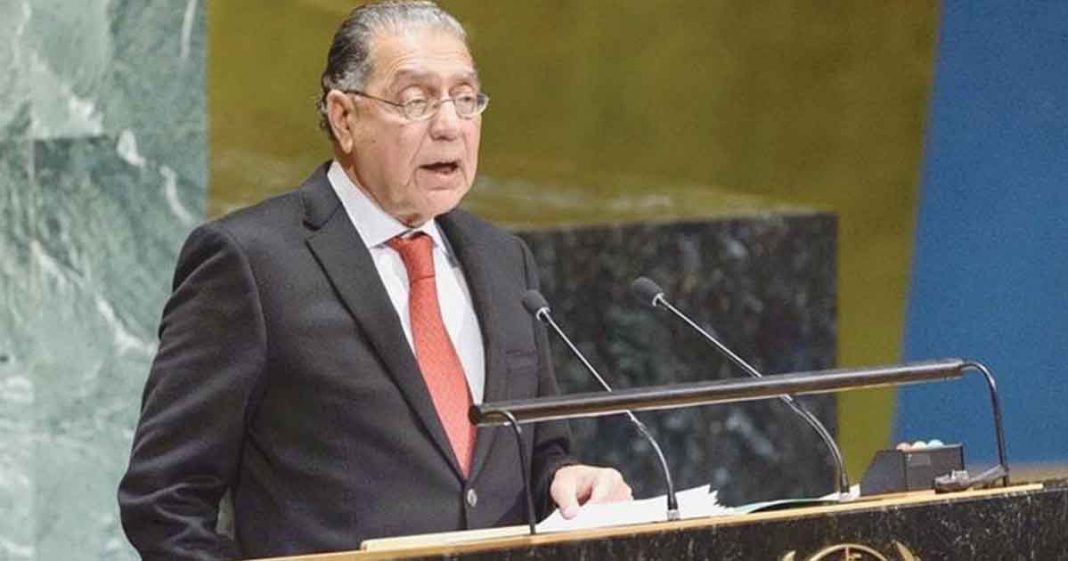As Pakistan completed its ECOSOC presidency tenure, debt restructuring and relief were pitched during this period. This arm of the United Nations organization deals with economic and social affairs on a global scale ensuring equitable development across borders.
Members are elected for three years to work for this social and economic coordinating arm of the UN and this Monday, eighteen new members were elected as Pakistan completed its term. ECOSOC 54 members are elected by the General Assembly voting consensus. Also, based on geographical location, seats on the council are allocated.
The storm of economic and development challenges
Pakistan’s Ambassador for the UN, Munir Akram, as he chaired the ECOSOC during Pakistan’s tenure claimed that with the help of colleagues from Fiji and the Netherlands, Pakistan pushed for massive debt relief, restructuring and economic facilitation through concessional assistance and SDR fund allocation.
The purpose was to enable the debt-ridden and poverty-stricken countries to come out from social and economic chaos. In doing so, these countries can be given an impetus to change their socio-economic conditions and provide massive relief to the distraught population by engaging strategically with the aid provided.
Read more: Prime Minister represents the developing world at ECOSOC session
Thus, countries like sub-Saharan Africa and the poorest countries of the Middle East and North Africa can be given access to this assistance as they battle with multiple concerns such as debt-traps, governance-trap, poverty-trap, war, conflicts, and diseases.
Munir Akram highlighted that during Pakistan’s tenure at ECOSOC, the global community was swept with massive economic and social turmoil. The severest challenge came in the form of the Covid-19 pandemic outbreak that paralyzed the social and economic lives of the people through a lockdown and social distancing measures.
As a result, unemployment surged and global supply chains become disrupted leading to the global economic meltdown. As the pandemic triggered the deepest recession in history, the brunt of this was faced by the poorest countries as the liquidity crisis rose and economic activity went into an impasse.
Collective action is the need of the hour
The economic crisis due to the pandemic came in the wake when the world economy was suffering a decline due to Sino-US trade War, according to IMF, the bilateral trade between the US and China was 17% and their trading contributed to 40% of the world trade.
As nationalist rhetoric rose as the right-wing populist governments came into power, the protectionist measures started creating fissures on the global economic profile. Moreover, as the US government under Former President Donald Trump withdrew from economic trade deals such as NAFTA, it turned away from its very economic liberalism concept and created bad precedents for states.
Read more: Biden: New Man in the White House; Pakistan’s way forward?
Thus, Munir Akram iterated that as pandemic struck at a time when challenges stand insurmountable along with catastrophic climate crises, the need for collective action and global cooperation became the need of an hour. He promoted his stance by claiming that states need to revert to the Paris Climate goals to ensure a sustainable environment for all and foster cooperation and unanimous action whose need is most felt in these testing times. After all, this notion of unanimity stands at the heart of the UN charter mandated by ECOSOC.
“The triple crisis we confront require a paradigm shift in our approach to global development, climate change & economic cooperation. It is time to convene another Summit Conference to agree on the structure & content of new international economic cooperation.” pic.twitter.com/Rlv1f0voS3
— UN ECOSOC President (@UNECOSOC) July 16, 2021
As this “triple crisis” struck the world — Covid-19, unequal development and climate change, the collective action was manifested with the attempts by UN and ECOSOC to equitably distribute the Covid-19 vaccine. In addition, they convinced the rich nations to help developing nations in coping with the crippling impact of the pandemic on their economies.
Read more: Coronavirus vaccines available to all as Pakistan joins UN campaign
Significantly, the RC system established by the UN has played a key role in assisting the developing countries to respond coherently to the health and economic consequences of the pandemic. This system consisting of humanitarian response and recovery agenda fosters timely distribution of medical supplies and relief packages in the backdrop of a level playing field of globalization.














